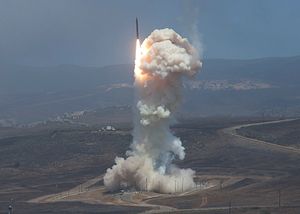When North Korean leader Kim Jong-un said in a New Year’s address that his country was on the verge of testing a missile that could one day reach the United States, Washington retorted that it was ready to stop it.
Defense Secretary Ash Carter, appearing on “Meet the Press” a week after Kim vowed to test an intercontinental ballistic missile at “anytime,” said the United States would shoot down any missile traveling toward its territory or the territory of its allies. Two days later, in his last briefing before President-elect Donald Trump takes office, Carter softened his stance slightly: if not considered “threatening,” such a missile might be allowed fly its course for intelligence-gathering purposes.
What Carter didn’t say on either occasion was that the United States might not be able to intercept such a missile at all. In fact, experts say, Washington’s defenses against such an attack are extremely limited despite decades of research and $180 billion spent since the 1980s.
Kingston Reif, a specialist at the Arms Control Association, told The Diplomat that Ground-Based Midcourse Defense, based in California and Alaska, would be the only current option for stopping an ICBM among numerous missile defense systems.
“The Aegis system is not designed for” intercepting a North Korean ICBM test, Reif said. “Nor is THAAD. GMD would only have a chance if it’s fired at the United States.”
Dr. Laura Grego, a missile defense expert at the Union of Concerned Scientists, said GMD had shown mixed results in tests so far.
“The GMD system has not had a great number of intercept tests, but of the 17, nine of them have been unsuccessful, and the record is not improving over time,” she said.
“These tests have been under simplified conditions, not those the system would face in real life. In fact, later this year will be the system’s first test against an ICBM range target. The Pentagon’s highest testing official has assessed that the system has not yet demonstrated operationally relevant capability.”
Grego said “you could hardly design a more challenging task” than hitting a small, fast-moving target such as an ICBM.
“Getting this to work reliably is an enormous engineering challenge,” she said. “Remember, the adversary always gets a vote, and may choose to attack in the most difficult conditions, and you’ll want to have tested your system under as many of them as possible — bad weather, when parts of your system is under maintenance, different times of day, etc.”
Grego said U.S. administrations felt pressure to reassure the public, giving them an incentive to exaggerate their capabilities.
“In fact, I think this has gotten in the way of building a system that works better, or at least has been tested better,” she said. “Building a system that has such a challenging mission, and one that works well, requires the greatest rigor and accountability. The process that we got was much more like building a system in a hurry that looks like it works rather than really works — a scarecrow, if you will.”

































